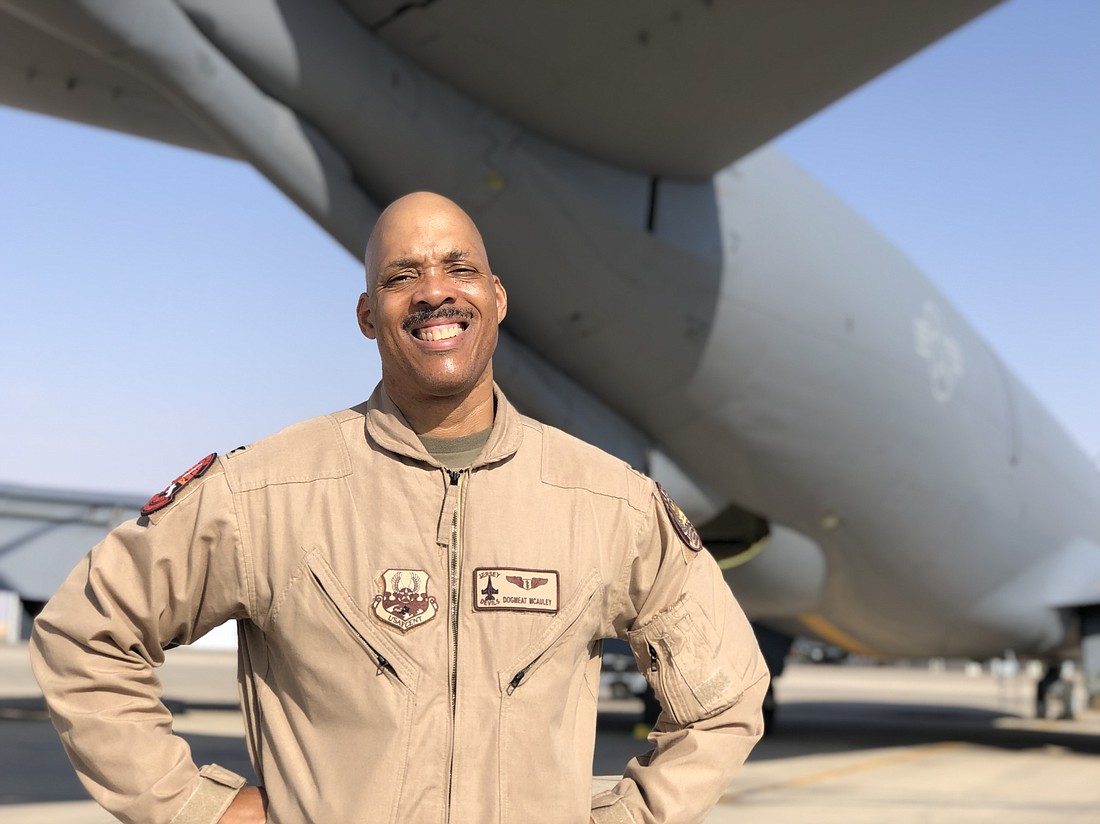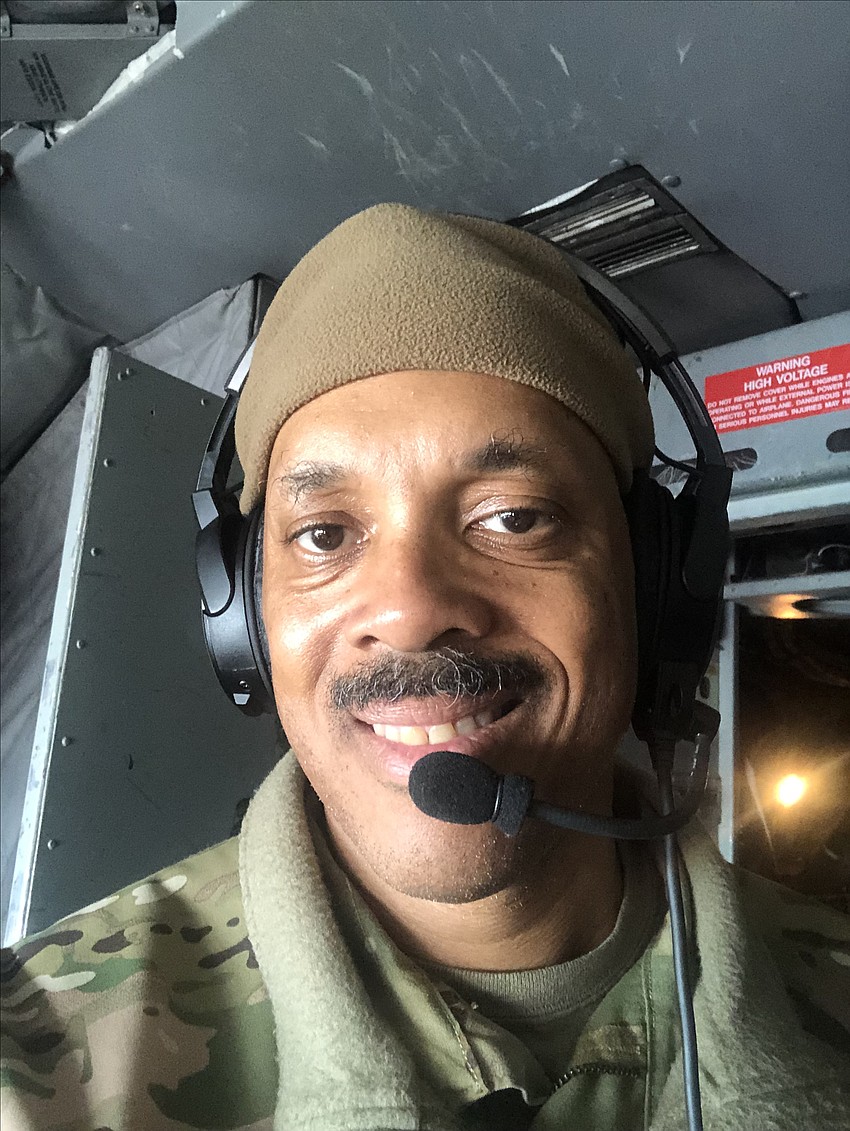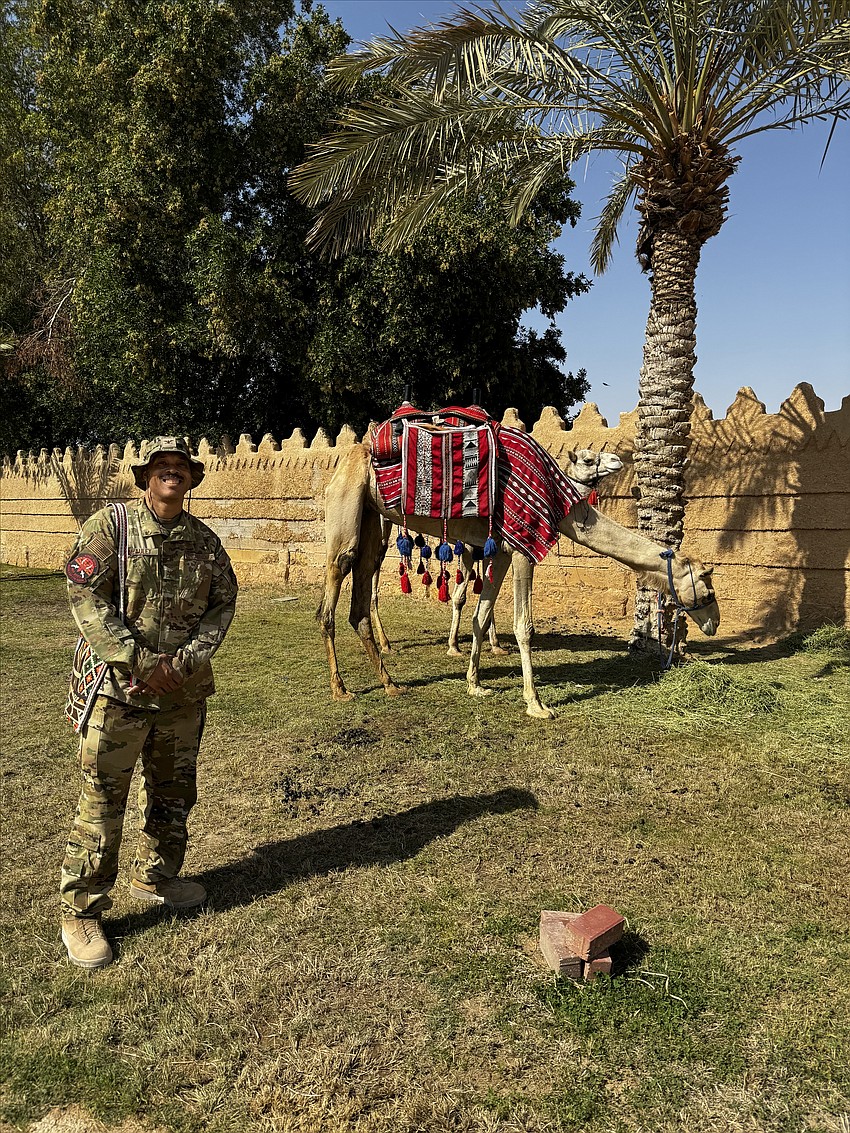- April 3, 2025
-
-
Loading

Loading

Darren C. McAuley, founding chair of the Department of Osteopathic Manual Medicine/Osteopathic Principles and Practices at the Orlando College of Osteopathic Medicine in Horizon West, returned last month to United States soil after serving the country overseas.
McAuley, 48, has completed more than 23 years of military service, in which he has served in the role of flight surgeon and participated in six deployments, including two to Baghdad, Iraq.
Administratively, McAuley currently functions as the State Air Surgeon for Florida and is stationed at Air National Guard headquarters in St. Augustine. Here, he is the medical authority for waivers, accessions and transfers into the Florida Air National Guard. In this role, he functions as the chief medical authority for more than 2,000 airmen throughout the state. In addition, he serves as the principal medical advisor to the Assistant Adjutant General – Air/Commander of the Florida Air National Guard.
“I joined the Air National Guard as a third-year medical student in 2000,” McAuley said. “As I wasn’t technically a medical professional while a student, I was unable to join the medical corps. So, instead, I joined as a medical service corps officer as a way to get my foot in the door and experience what the Air Force was like. I was inspired by a desire to serve and to continue to take part in what has been somewhat of a family legacy with both my grandfather and uncle having served in the military.”

MEDICAL JOURNEY
Originally from Plainfield, New Jersey — although he spent the first nine years after completing his medical training in Philadelphia — McAuley always knew he wanted to become a physician.
He graduated with a Bachelor of Arts degree in biology in 1997 from Vassar College. In his third and fourth years, he served as an EMT and the coordinator for campus emergency medical services.
In 2002, he graduated from the University of Medicine and Dentistry - School of Osteopathic Medicine in New Jersey and subsequently completed a rotating internship within the UMDNJ system at Christ Hospital.
He went on to complete a residency in neuromusculoskeletal medicine and osteopathic manual medicine through the New York College of Osteopathic Medicine Educational Consortium in New York at United, St. Barnabas and Plainview hospitals.
“I started my medical career as a first-aider and later EMT while in high school,” he said. “I thought, at first, that I would become an emergency room physician as a natural offshoot of this exposure. However, during my first year of medical school, I discovered that I had both an aptitude and passion for osteopathic manual medicine. The satisfaction that comes from using my hands and my mind to realign body structure and, in turn, observing a sometimes-near-immediate change in body function and patients’ pain continues to drive my desire to teach and pass on this art to the next generation of healers.”
Seeking a different musculoskeletal approach and hoping to expand his skill set, McAuley completed a sports medicine fellowship in 2007 in Reading, Pennsylvania.
He joined the Philadelphia College of Osteopathic Medicine after his fellowship as an assistant professor of OMM and became actively engaged in teaching first- and second-year students in the didactic and practical setting.
In addition to precepting third- and fourth-year students, he had the opportunity to teach specialized undergraduate OMM fellows.
McAuley became the lead faculty for the third-year sports medicine curriculum and offered students the ability to observe a unique combination of manual and injection-based medicine.
In 2012, he became a fellow in the esteemed American Osteopathic Academy of Sports Medicine.
The following year, McAuley completed a master’s degree in medical education and leadership from the University of New England - College of Osteopathic Medicine. The same year, he successfully attained board certification in pain medicine and currently is board certified in all three specialties he practices and teaches (osteopathic manual medicine, sports medicine and pain medicine).
While at PCOM, McAuley served as an OMT consultant and sports medicine physician for the Philadelphia Phillies baseball and U.S. rowing teams.
In 2016, McAuley joined the Veterans Health Administration in Viera as the primary care pain management physician and was able to offer his unique skill set to the nation’s veterans and active duty servicemen.
There, he was the first physician to practice osteopathic manual medicine and spearheaded the creation of protocols for the credentialing of physicians to perform OMT within the facility.
His practice centered on ultrasound-guided injections and procedures, OMT, battlefield acupuncture, medication prescription, and the oversight of physical therapy modalities and orthotic/prosthetics usage.
Concurrent to his time practicing medicine as a civilian, as a medical student, McAuley joined the Delaware Air National Guard as a Medical Service Corps officer.
“I’ve had the privilege of taking care of injured servicemen and women in combat zones in the Middle East, notably in Iraq and in Syria,” he said. “There is always a measure of satisfaction knowing that you have been able to help people who are closer to the front and who are participating in battle.”

OCOM OPPORTUNITY
McAuley was first contacted by a former student about the opportunity at OCOM.
“I was drawn to the school by the unique opportunity to help build the curriculum,” he said. “All medicine in general, but osteopathic manual medicine in particular, is somewhat of an art in addition to a science. The opportunity to be a part of a school from its inception and the ability to mold its curriculum is both rare and an honor.”
McAuley believes the school’s curriculum is truly what makes the institution unique.
“At OCOM, our curriculum is focused on being case based and problem based,” he said. “We’ve spent a significant amount of time focusing on what we need to teach students so that they can attain academic excellence and professional efficiency. I’ve seen approaches to teaching medical students that rely on route memorization of facts and trivia. Here at OCOM, we have made every attempt to help students focus on what will make them better osteopathic physicians. Students will, of course, memorize details along the way. However, the curriculum has been designed to stimulate thought and encourage lifelong learning.”
In his role at OCOM, McAuley currently is the school’s leading expert in osteopathic principles and practices. He leads the department whose primary role is to ensure that osteopathic thought and intervention are not just incorporated into the curriculum but are the driving forces behind it.
“We currently have three full-time faculty members who assist in this task,” he said. “Once students matriculate, we will switch gears from building the curriculum to imparting it to students so that they are best prepared to pass their boards, obtain licenses and ultimately become physician leaders in the community.”
Robert Hasty, dean and chief academic officer at OCOM, said the school is incredibly fortunate to have McAuley.
“In addition to being a superb educator, he is the highest-ranking physician in the Air Force in the state of Florida,” Hasty said. “He also happens to be the only African American (who) holds the chair of Osteopathic Principles and Practice at any medical (center) in the nation. We are incredibly proud of him and grateful for his service.”
OCOM will open in August in Horizon West at 7011 Kiran Patel Drive, Winter Garden.
COMING HOME
McAuley resides with his wife and three children, all under age 8, in Pinellas County, although he currently is in the process of moving to Orlando.
When he’s not working, he enjoys spending time with his family and friends.
He can be found focusing on self-care and wellness, including strength training exercises, yoga and, of course, receiving his own osteopathic manipulation.
Although there are many benefits to medicine continuing to become more “high-tech,” McAuley’s passion for medicine continues to stem from what some may consider “low-tech.”
“(It’s) talking to and understanding people,” he said. “Patients may not understand the intricacies of medicine but they often understand the nuances of their own bodies. They know when something is new, different or wrong. The combination of building a relationship and dialogue with patients in conjunction with a thorough physical exam continues to be the most underutilized set of tools in medicine.
“Osteopathic manual medicine is distinct precisely because it meshes the different aspects of this both simple and complex approach” McAuley said. “I’m passionate about passing this knowledge on to students who can in turn continue to make sure that patients in the community are exposed to the difference that is osteopathic medicine.”